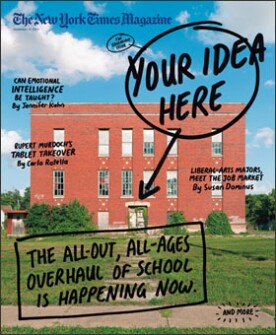This is evidently “education week” at The New York Times.
I don’t mean to imply any connection between this blog’s parent and the Gray Lady. I’m referring to the fact that Sunday’s edition of The New York Times Magazine was the education issue, with five major feature stories, and more, on school and college issues under the cover headline, “The All-Out, All-Ages Overhaul of School Is Happening Now.”
And on Tuesday, the paper will hold its 3rd annual “Schools for Tomorrow” conference at its headquarters near Times Square in Manhattan.
The lead story in the Sunday magazine is “No Child Left Untableted,” by Carlo Rotella of Boston College. It’s a profile of Amplify, the education division of Rupert Murdoch’s News Corporation, which is led by former New York City Schools Chancellor Joel I. Klein.

Rotella, the director of American studies at BC, is skeptical of the company’s plan to sell school districts a custom Android tablet for each teacher and student, with curriculum, games, and other tools.
The tablets “struck me as exemplifying several dubious American habits now ascendant: the overvaluing of technology and the undervaluing of people; the displacement of face-to-face interaction by virtual connection; the recasting of citizenship and inner life as a commodified data profile; [and] the tendency to turn to the market to address social problems,” Rotella writes.
Klein tells him that “K-12 isn’t working” and that “we keep trying to fix it by doing the same thing, only a little different and better.”
Amplify’s efforts are about being “a lot different and better,” Klein says.
Rotella, who visits both a pilot school-training session for the tablets and Amplify’s educational game development site, argues that good teachers make all the difference, and he concludes that “it seems misguided to try to improve the process of learning by putting an expensive tool in the hands of teachers we otherwise treat like the poor relations of the high-tech whiz kids who design the tool.”
Other features in the magazine’s package include a book excerpt about a high school drama program in Levittown, Pa.; a piece on “social-emotional learning” and the idea that emotional skills are crucial to academic performance; and two higher education pieces, one about how liberal-arts colleges are priming their students to think about career choices, and the other about a 16-year-old boy genius from Mongolia who is attending the Massachusetts Institute of Technology.
Oh, and there’s a nice little feature on the magazine’s “Who Made That?” page about the built-in eraser. It makes a nice counterpart to the infographic in the recent “Education Life” section of the Times about the Dixon Ticonderoga No. 2 pencil.
Meanwhile, the agenda for the newspaper’s Schools for Tomorrow conference is heavy on online learning and higher education issues. The keynoter is Sal Khan, of Khan Academy, with other discussions geared around “The Disruption of Higher Education,” “What’s the New Era Business Model for Higher Education?” and “Debate: Has the University as an Institution Had Its Day?”
Many of the discussions will be led by Times columnists and other correspondents, including Washington bureau chief David Leonhardt, op-ed columnist Bill Keller, and deputy national editor Ethan Bronner.
In fact, so many Times newsroom staff members are participating in the conference, they might not be able to put out the paper on Wednesday. (I kid because I wish I could attend.)
